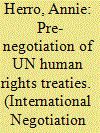| Srl | Item |
| 1 |
ID:
153527


|
|
|
|
|
| Summary/Abstract |
Why has the perennial idea of a permanent, individually recruited UN force never been realised? Scholars have responded to this question by interrogating the attributes of the various ideas but this only provides a partial answer. This article explores the latest proposal for a UN standing force – the UN Emergency Peace Service (UNEPS) – through the lens of a transnational advocacy network (TAN) and the external issues affecting its ability to put the idea on the UN’s agenda. It engages with social movement literature, and draws on interviews with those in the campaign to establish a UNEPS, participant observation, and analyses of primary and secondary sources. It argues that, in addition to contentions surrounding aspects of the UNEPS proposal, the failure to leverage the expertise of all network members and the lack of geographically diverse advocates, partly explain the inability of the TAN to achieve its goals. While there were some political opportunities, such as the support of influential allies and focusing events, an inhospitable political and normative climate, the lack of a state champion, UN body and journalists further contributed to the demise of the campaign.
|
|
|
|
|
|
|
|
|
|
|
|
|
|
|
|
| 2 |
ID:
085678


|
|
|
|
|
| Publication |
2008.
|
| Summary/Abstract |
The extensive experience of the United Nations in peacekeeping and peacebuilding is beginning to reap rewards in terms of lessons learned and improved peacebuilding practice. Evolving peacebuilding theory and ideas about best practice to promote sustainable peacebuilding have been boosted by the creation of the UN Peacebuilding Commission (PBC). This paper reviews sustainable peacebuilding theory and the potential contribution of the PBC to addressing some of the challenges faced by non-UN interventions such as the Australian-led Regional Assistance Mission to the Solomon Islands (RAMSI), as well as the US-led interventions in Iraq and Afghanistan. We argue that the adoption by non-UN interventions of peacebuilding
|
|
|
|
|
|
|
|
|
|
|
|
|
|
|
|
| 3 |
ID:
097652


|
|
|
|
|
| Publication |
2009.
|
| Summary/Abstract |
This article outlines the potential benefits of establishing a UN Emergency Peace Service (UNEPS). It argues that a UNEPS could have helped overcome some of the practical and political obstacles faced by the UN Assistance Mission in Rwanda (1993-1994), the AU Mission in Sudan and UN support packages in Darfur (2006-2008).
|
|
|
|
|
|
|
|
|
|
|
|
|
|
|
|
| 4 |
ID:
165679


|
|
|
|
|
| Summary/Abstract |
Since 1965, nine UN human rights treaties have been adopted. Surprisingly, we know little about the conditions under which states arrived at the negotiation table because there has been no serious attempt to empirically identify the unique attributes of pre-negotiation in this context. This article examines the pre-negotiation of the UN Convention on the Rights of Persons (CRPD), drawing on diverse qualitative data sources such as interviews with state and non-state participants. Informed by a constructivist perspective, this study identifies esteem-seeking behavior as a key motivation for some states to negotiate. The article also shows how a transnational advocacy network influenced the pre-negotiation process by leveraging states’ esteem-seeking ambitions and appealing to their reputation as a way of pushing parties to negotiate. Additional tactics that the transnational advocacy network employ at the international level to expedite negotiations are also identified.
|
|
|
|
|
|
|
|
|
|
|
|
|
|
|
|